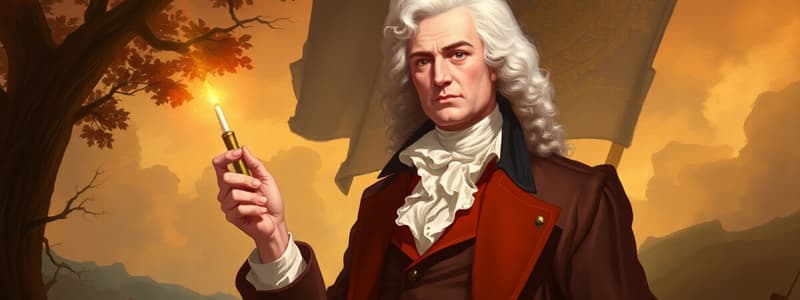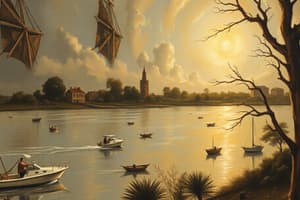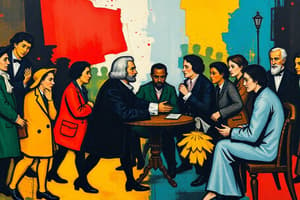Podcast
Questions and Answers
Where does Rousseau's work suggest sovereignty resides?
Where does Rousseau's work suggest sovereignty resides?
- In the state of nature
- In the hands of a single ruler
- In all the people of the society as a collective, opposed to the government (correct)
- Exclusively in the government
What does Paine propose as the form of government for the independent colonies?
What does Paine propose as the form of government for the independent colonies?
- A totalitarian regime to ensure unity and stability
- A representative democracy giving equal weight to each colony (correct)
- A monarchy with a constitution to limit the king's power
- A theocracy governed by religious leaders
According to Thomas Paine, what is the origin of monarchy?
According to Thomas Paine, what is the origin of monarchy?
- It is a consequence of the ancient Jews' decision to have a king
- It originates from sin and is condemned by the Bible and God (correct)
- It is a natural progression of human society
- It is a result of the desire for order and stability
What does Thomas Paine believe about the value of government?
What does Thomas Paine believe about the value of government?
How did Rousseau's conception of the state of nature differ from Hobbes' view?
How did Rousseau's conception of the state of nature differ from Hobbes' view?
Who was the de facto leader of the French government while Louis XIV was a child?
Who was the de facto leader of the French government while Louis XIV was a child?
What symbol did Louis XIV choose at the start of his reign as his personal emblem?
What symbol did Louis XIV choose at the start of his reign as his personal emblem?
What did Louis XIV swear to defend during his coronation?
What did Louis XIV swear to defend during his coronation?
What did the Edict of Fontainebleau, signed by Louis XIV, do?
What did the Edict of Fontainebleau, signed by Louis XIV, do?
According to Rousseau, what makes natural man physically free?
According to Rousseau, what makes natural man physically free?
What did Rousseau believe was responsible for societal ills in modern society?
What did Rousseau believe was responsible for societal ills in modern society?
What did Rousseau consider the most fundamental objective of good government?
What did Rousseau consider the most fundamental objective of good government?
What did Rousseau aim to outline in The Social Contract and other political works?
What did Rousseau aim to outline in The Social Contract and other political works?
Flashcards
Rousseau's Sovereignty
Rousseau's Sovereignty
Rousseau believed that sovereignty comes from the collective will of the people, opposing the idea of a government or single ruler holding power.
Origin of Monarchy (Paine)
Origin of Monarchy (Paine)
Paine argued that monarchy is not a natural or divinely ordained form of government, but rather a result of human actions.
Paine's Ideal Government
Paine's Ideal Government
Paine advocated for a representative democracy where each colony has a say.
Value of Government (Paine)
Value of Government (Paine)
Signup and view all the flashcards
English Civil War Winner
English Civil War Winner
Signup and view all the flashcards
De Facto French Leader (Louis XIV)
De Facto French Leader (Louis XIV)
Signup and view all the flashcards
Louis XIV's Symbol
Louis XIV's Symbol
Signup and view all the flashcards
Louis XIV's Coronation Oath
Louis XIV's Coronation Oath
Signup and view all the flashcards
Edict of Fontainebleau
Edict of Fontainebleau
Signup and view all the flashcards
Natural Man's Freedom (Rousseau)
Natural Man's Freedom (Rousseau)
Signup and view all the flashcards
Cause of Societal Ills (Rousseau)
Cause of Societal Ills (Rousseau)
Signup and view all the flashcards
Rousseau's Good Government Aim
Rousseau's Good Government Aim
Signup and view all the flashcards
Rousseau's Focus in 'Social Contract'
Rousseau's Focus in 'Social Contract'
Signup and view all the flashcards
Study Notes
Rousseau's View of Sovereignty
- Rousseau argued that sovereignty resides in the people, not in a monarch or any other individual.
- He believed that the general will of the people should guide the government and law-making.
Paine's Proposal for Colonial Government
- Thomas Paine proposed a representative republic as the form of government for the independent colonies.
- He advocated for a system where the people elect representatives to make decisions on their behalf.
Paine's View on Monarchy
- Paine believed that monarchy originated from the illegitimate claims of power by those who sought to control others.
- He saw it as a form of tyranny and argued against its legitimacy.
Paine's Perspective on Government
- Paine viewed government as a necessary evil, designed to protect the liberties of individuals and ensure the common good.
- He believed that its power should be limited and subject to the consent of the governed.
Rousseau vs. Hobbes on the State of Nature
- Rousseau's conception of the state of nature differed from Hobbes' view, suggesting it was a peaceful and harmonious state.
- Rousseau believed that humans were naturally independent and free, while Hobbes saw the state of nature as a "war of all against all."
Leader of France During Louis XIV's Childhood
- While Louis XIV was a child, the de facto leader of the French government was his mother, Anne of Austria, who held the regency title.
- She ruled with the aid of Cardinal Mazarin.
Louis XIV's Personal Emblem
- At the start of his reign, Louis XIV chose the Sun as his personal emblem.
- This symbol represented his absolute authority and the belief that he was the center of power.
Louis XIV's Coronation Oath
- During his coronation, Louis XIV swore to defend the Catholic faith and the rights of the French people.
- This oath reaffirmed his role as the divinely ordained ruler of France.
Edict of Fontainebleau
- The Edict of Fontainebleau, signed by Louis XIV, revoked the Edict of Nantes, which had granted religious freedom to Protestants in France.
- This act led to the persecution of Protestants and their emigration from France.
Rousseau's View of Natural Man
- According to Rousseau, natural man is physically free from constraints and limitations. He exists in a state of natural autonomy.
- He believed that human's innate capacity for freedom is limited by their dependence on others in a society.
Rousseau's View on Societal Ills
- Rousseau believed that societal ills, such as inequality, injustice, and moral decay, were primarily caused by the development of private property and the establishment of a complex social hierarchy.
- He argued that society corrupted the natural goodness of humans.
Rousseau's View on Good Government
- Rousseau considered the most fundamental objective of good government to be the preservation of individual liberty while ensuring the common good.
- He believed that a government should reflect the general will of the people.
Rousseau's Aim in Political Works
- Through The Social Contract and other political works, Rousseau aimed to outline a framework for a political system based on social contract theory, where individuals voluntarily surrender some of their freedoms in exchange for the benefits of a shared society.
- His goal was to create a system that balanced individual liberty with collective good.
Studying That Suits You
Use AI to generate personalized quizzes and flashcards to suit your learning preferences.




